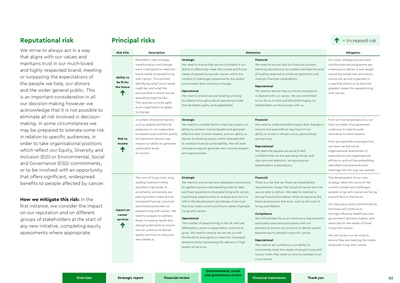
Risk title Description Dimension Mitigation
Ability to
be fit for
the future
Macmillan's new strategy,
transformation and change
work is designed to meet the
future needs of people living
with cancer. This involves
identifying what future needs
might be, and what the
environment in which we are
operating might be like.
This requires us to be agile
as an organisation to adapt
to change.
Strategic
We need to ensure that we are confident in our
ability to effectively meet the current and future
needs of people living with cancer within the
context of challenges presented by the global
environment and continuous change.
Operational
We need to ensure we are creating a strong
foundation through a robust operating model
that facilitates agility and adaptability.
Financial
We need to ensure that our financial scenario
planning assumptions accurately estimate the level
of funding required to continue operations and
maintain financial sustainability.
Reputational
We need to ensure that our future proposition
is aligned with our values. We are committed
to our focus on ESG and EDI and bringing our
stakeholders on the journey with us.
Our open strategy process and
transformational programme are
underway to deliver a new target
operating model that will ensure
we are set up and organised in
a way that allows us to have the
greatest impact for people living
with cancer.
Risk to
income
A number of external factors
such as additional financial
pressures on our supporters,
increased costs and the quality
of investment returns may
impact our ability to generate
sustainable levels
of income.
Strategic
We need to consider factors that may impact our
ability to achieve income targets and generate
effective new income streams, and our ability to
deliver fundraising events within tolerable ROI
to maintain financial sustainability. We will seek
innovative ways to generate new income streams
and opportunities.
Financial
We need to understand the impact that changes in
income and expenditure may have on our
ability to invest in infrastructure, partnerships
and services.
Reputational
We need the people we serve to feel
confident that we are spending money with
due care and attention, recognising our
stakeholders' expectations.
From an income perspective, we
have a number of programmes
underway to take forward
innovative income streams.
From an expenditure perspective,
we have carried out an
organisational assessment of
expenditure and organisational
efficiency and will be embedding
identified improvements and
learnings into the way we operate.
Impact on
cancer
services
The cost of living crisis, long
waiting treatment times
and often high levels of
uncertainty and anxiety are
placing further stress and an
increased financial, practical
and emotional burden on
people living with cancer. We
need to prepare to address
these increasing needs and
changing demands to ensure
we can continue to deliver
quality services to everyone
who needs us.
Strategic
We need to ensure we have adequate mechanisms
for gathering and understanding external data
and lived experience of people living with cancer,
maximising opportunities to analyse and use it to
inform the development and design of services
that truly meet current and future needs of people
living with cancer.
Operational
The number of people living in the UK who are
affected by cancer is expected to continue to
grow. We need to ensure we are set up with
the flexibility and agility to meet this increased
demand whilst maintaining the delivery of high
quality of services.
Financial
There is a risk that our financial sustainability
requirements impact the scope of cancer services
we are able to deliver. We need to maintain a
strong financial foundation while recognising the
financial pressures that exist, such as the cost of
living and inflation.
Compliance
We will maintain focus on continuous improvement
and quality assurance processes with our
partners to ensure we continue to deliver quality
experiences to people living with cancer.
Reputational
We need to be confident in our ability to
consistently meet the needs of people living with
cancer when they need us most to maintain trust
in our brand.
The development of our new
strategy takes into account the
current climate and challenges
people living with cancer are facing
and will face in the future.
Our Advocacy and Communications
functions will continue to
strongly influence healthcare and
government decision makers, and
advocate for the needs of those
living with cancer.
We will review our services to
ensure they are meeting the needs
of people living with cancer.
Reputational risk
We strive to always act in a way
that aligns with our values and
maintains trust in our much-loved
and highly respected brand, meeting
or surpassing the expectations of
the people we help, our donors
and the wider general public. This
is an important consideration in all
our decision-making however we
acknowledge that it is not possible to
eliminate all risk involved in decisionmaking.
In some circumstances we
may be prepared to tolerate some risk
in relation to specific audiences, in
order to take organisational positions
which reflect our Equity, Diversity and
Inclusion (EDI) or Environmental, Social
and Governance (ESG) commitments,
or to be involved with an opportunity
that offers significant, widespread
benefits to people affected by cancer.
How we mitigate this risk: In the
first instance, we consider the impact
on our reputation and on different
groups of stakeholders at the start of
any new initiative, completing equity
assessments where appropriate.
Principal risks = Increased risk
82
Environmental, social
and governance review
Financial review
Strategic report
Overview Financial statements Thank you